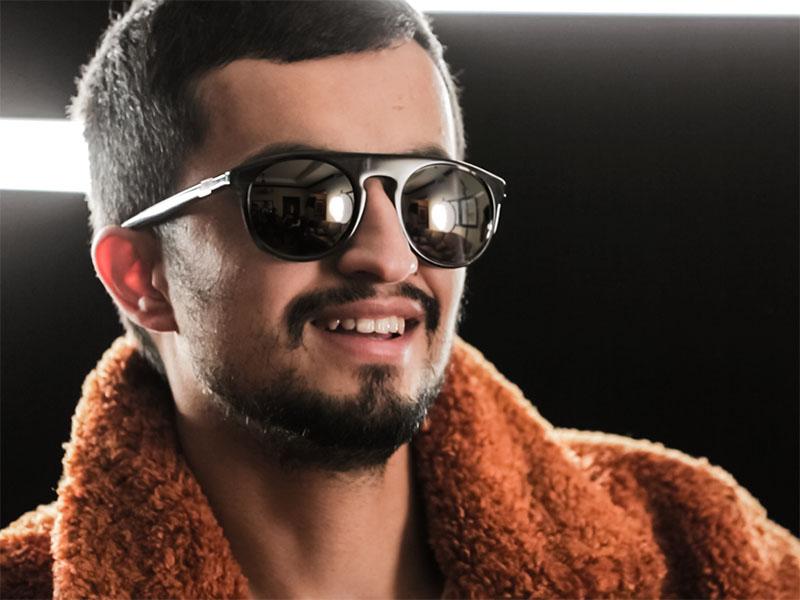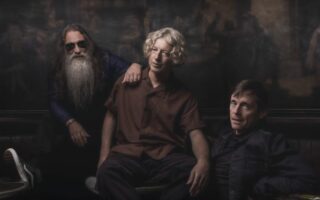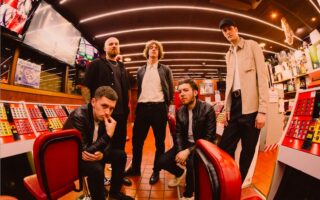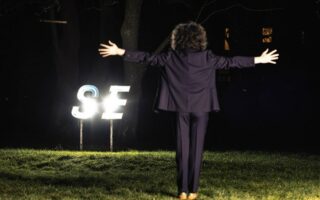
Kabul Dreams with Live4ever @ SXSW 2019 (Paul Bachmann / Live4ever)
When a band has been operating for over a decade it can appear almost insulting to tell the story of their gestation. Their priority will and should always be their present, but as the first rock band from Afghanistan, Kabul Dreams’ beginnings will always be interesting.
Fortunately, they are aware of their significance and derive strength from it, as well as the draw of contemporary rock music as a whole.
How did the band come into being?
Sulyman: We were born and raised in Kabul, but during the civil war we were refugees in neighbouring countries. We all went back after the Taliban collapsed. Back in 2008 I met Siddique in Kabul through a friend. He thought, ‘You’re weird, I have some friends who are weird, maybe you might get along’. They were in this small studio doing commercial things and I went up with my guitar. I said, ‘I have a few songs, and I want to make a band’. It was that time when MySpace was a thing so we recorded a single and put it up on MySpace. That was the only option for us; in Afghanistan there’s no scene. From there we did a festival in India, which was a huge stage.
Siddique: I started playing bass in the band on the day we started the band! These guys had been playing instruments for years. I grew up in a traditional Uzbekistan town with rations on rock music. But I knew that I was there temporarily, so whatever I made wasn’t going to last long. I connected with Kurt Cobain’s lyrics as I was a teenager. I got to the point where I didn’t even want to go out, I wanted to stay in and make music.
What are your songs about?
Siddique: The subject keeps on changing. Sadae Man Dari means ‘my voice’, and it’s about feeling the need to write a song that unites us. We’re all from different parts of Afghanistan, we speak in different languages. It’s a reflection of what the country has been through; we have a lot of divisions in the country but it’s changed a lot now. The youth doesn’t really care as much. Then you travel and you see how the western media is portraying your city. You question things about your city and you don’t find an answer. The first album is different from the second album because things have changed.
You go back home and things have changed because your experience has changed, you’ve opened your eyes. Then you have government and elements of society that bother you, and you write about that. But then there are things you write about, as a songwriter, that you and 38 million people are going through. It’s a struggle and it’s not only me. We try and do that justice.
You’re based in the USA. Are you rock stars back home?
Sulyman: We don’t have that culture there. That culture of rock stars from the west doesn’t exist there, but we’ve been played on radio. We brought a video to a music station but they couldn’t fit it into any of the categories that they play, so they didn’t play it. It got to a point where we went to festivals and we got attention from international media. People found out about us from there and it reflected back. So we started performing in the city and started having a tiny following. Then they were playing our stuff and we were invited on to TV.
Siddique: But we’re working on a new EP, all in Farsi. We have fun singing in our own language, it’s not an obligation. We sing in both Farsi and English. In order to keep doing what you want to do, you have to be a little bit strategic. When we started playing rock and roll it was an introduction to that genre of music to people. So you have to be an information resource. People started asking loads of questions. But you have to be patient; if you say ‘f**k you all’ to everyone then who are you playing for? If you’re a performing artist you have to perform. As much as we grew a great community back home, we grew up with people who hated us for a thousand reasons; how we dress, how we look. You need to start changing the minds of those around them, or at least allow them to be open.
What was the process of leaving Afghanistan and living in the States?
Siddique: Everything is very inter-related. We did everything we could back home musically. There is only so much you can do. We wanted to play bigger shows and reach a different audience. There is only a few places you can go, and where we’re from you don’t get much choice. Our first gig in America was at SXSW five years ago, and then it was a musical choice in the beginning. The thing about Kabul is when we play shows, we had to go low profile for a month so people can find out about you. We had to change rehearsal rooms so many times so as not to bother people. We became very good at sound-proofing rooms!
Sulyman: There was a point where we had become popular back home after doing some ads. We were on TV and all that stuff and having bigger shows. That comes with negatives; there was a period where we weren’t doing any press because the way they were showing us was as if the aim of our music was to oppose them or something! But sometimes we had direct threats; sometimes our show got cancelled, sometimes they cut the electricity when we were playing. Sometimes the venue had to indirectly ask us to stop because they were afraid something was going to happen.
Siddique: Sometimes boys and girls started dancing along when we were playing. That wasn’t good, but they’re not doing anything bad. When you’re in the States you get musical freedom and a lot access, which is something that makes you appreciate where you’re from. But that country still gave us a lot of inspiration and it taught us how to be a really strong DIY band.
So what of the future? What are your aspirations?
Sulyman: When we came to America, everything was 100% different to what we expected. The America dream doesn’t happen. Where we come from there’s only one rock band and a few good painters. But we went to LA and everybody is somebody so you get overwhelmed at the beginning. You have to step back to move forward, so we took our time. We had to figure out how to record our second album, how we were going to record, where to record…all the logistics. We focused on how we could manage it for the long term.
We recorded the second album with Alan Sanders, a Grammy winning sound engineer and producer. We recorded part of it in Oakland then we flew to Alan’s studio to finish it. That was a great experimental experience for us. Now we know how to navigate the recording process. You don’t have the luxury of taking a long time as a DIY band. You have to be strategic as you only have so much time and you have to do a lot of hard work before coming to the studio. It doesn’t matter how you feel, you have to record five tracks in a day. That’s the reality.
Siddique: Back home, we did everything ourselves but here you need to find the connections. Last year was when we realised we were able to play a lot of shows. We had a good year and played some good venues. And we also found some stability personally. To get adjusted in that way, financially or culturally, you have to get used to it. Now we’re able to get back to our music. We’ve always had it embedded in our minds that our story’s interesting, but if people come and see us we want the music to be good, as much as we can. We take that seriously. The music has always been the priority. We didn’t want to take advantage of our history.
Sulyman: We’re trying to push the music, but the story’s in there. That’s how it is. But there’s music – come to our shows and see. We’re not forcing you to like it. We try not to get caught up in where we’re coming from and use that to our advantage. We’re proud of where we’re from, but sometimes people use the country’s name as a negative, because of war and everything. But that country gave us whatever we’re doing right now and made us what we are.
Siddique: The EP is next, all in Farsi. That didn’t disappear, we’re still doing it.
Sulyman: I don’t think any Afghan band has been together for ten years, but a few bands came after us. I don’t know what they are doing, but they’ve tried and did a pretty good job. When we saw other bands from the neighbouring countries we got inspired by them as we had a similar struggle. If somebody gets inspired by what we do now that would make us happy. That’s the main goal.
That social responsibility was born with the band.
Connect:
Facebook, Twitter, Instagram





